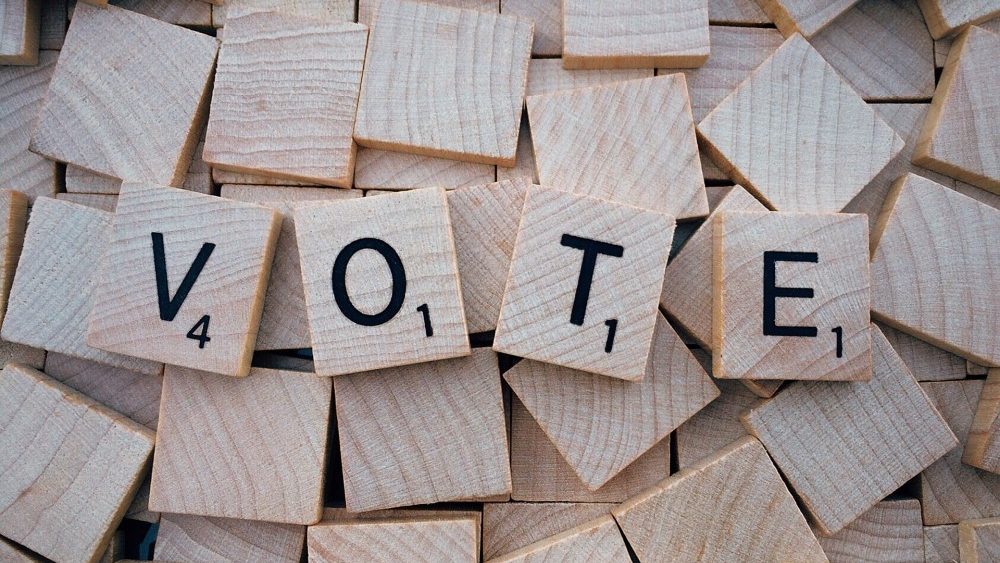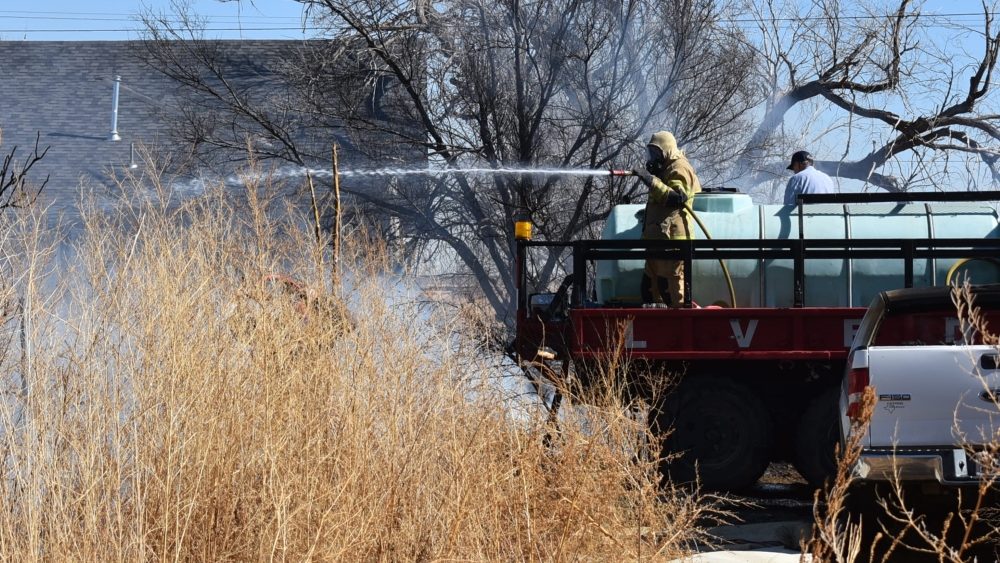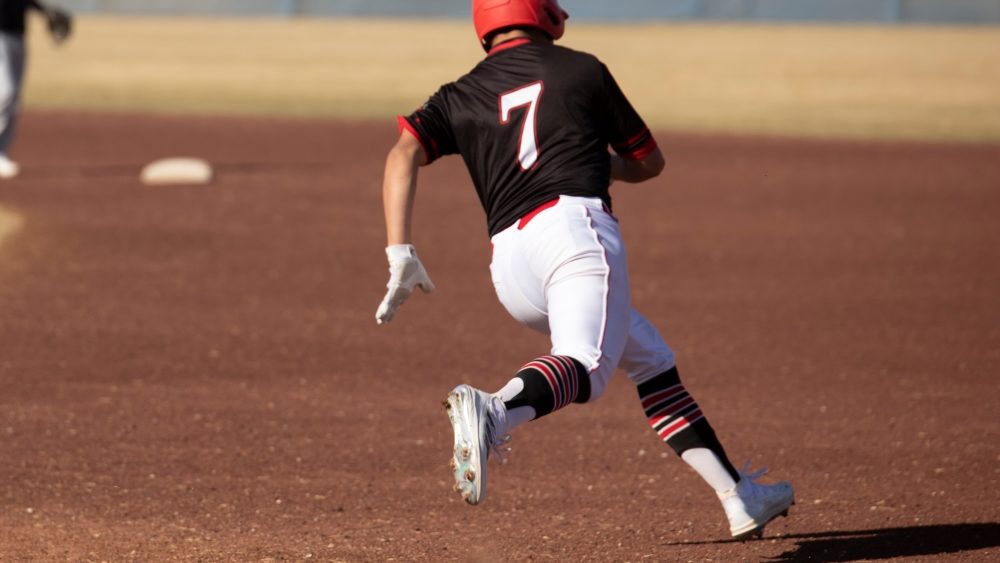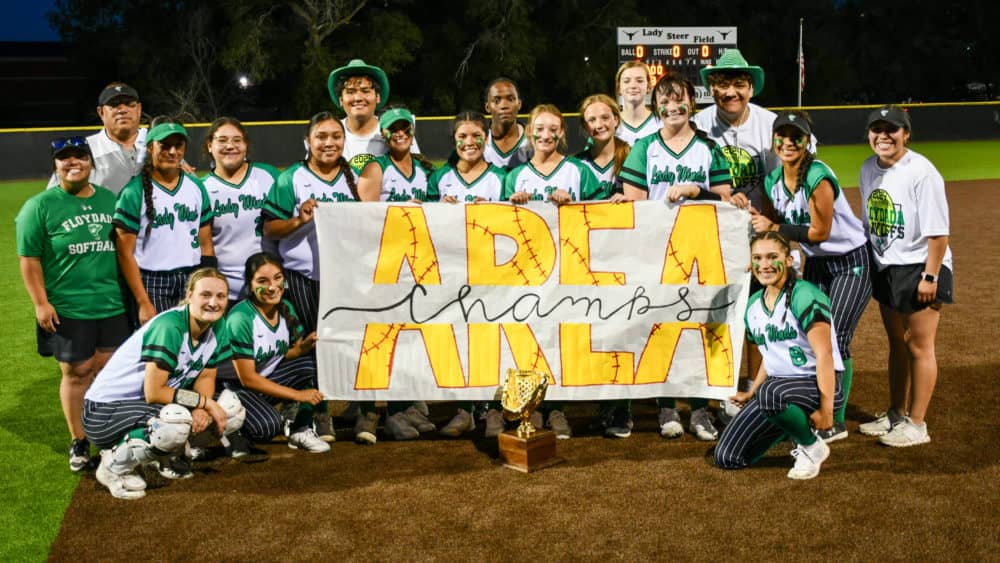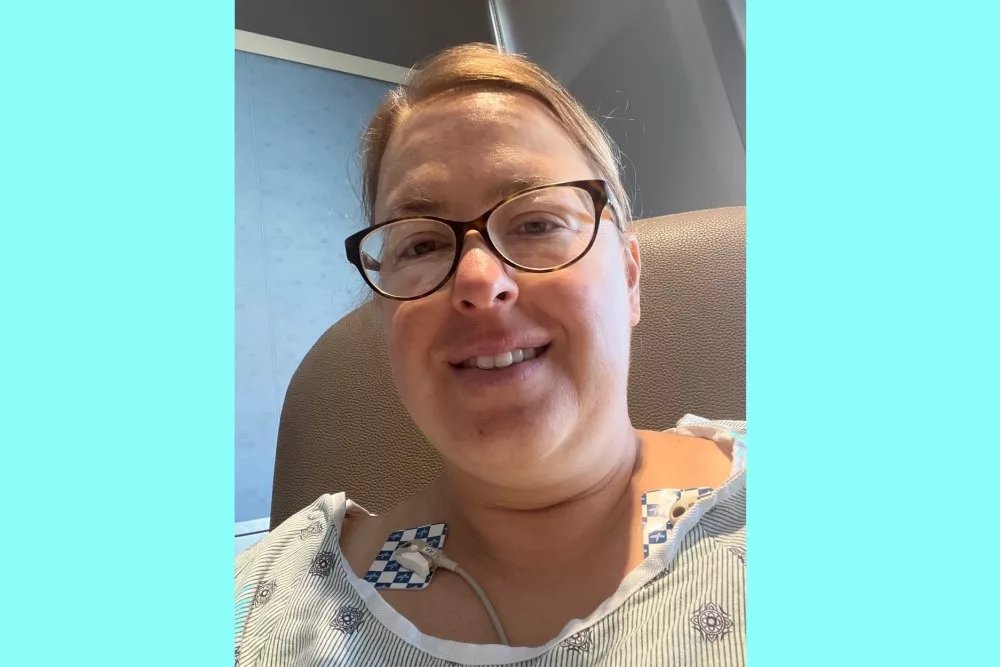
Beth Logsdon, a few hours after the transplant procedure. (courtesy photo)
FLOYDADA, TX – “I think it’s sad that in today’s world, it’s weird to be kind.”
For Matt Nix, weird, in this case, is the difference between life and death.
Back in 2013, he was a teacher at Floydada High School and later moved away. Not so surprisingly, Nix also became Facebook friends with Beth Logsdon, who taught at the same school. However, on July 26, 2023, these former colleagues and social media friends found another common thread in their lives – a kidney.
“I learned of the opportunity to donate when he posted it on Facebook last spring,” explains Logsdon, “He had some missed opportunities for a transplant, so he posted about his need on social media. Last spring, I really felt the need to find out if I was a match and could be approved for donation. I went through testing for a little more than a year, including some testing in Lubbock and some in Dallas. I didn’t think I would be approved, but I was determined to keep going until the transplant center said no. They never did.”
But what makes someone want to donate a kidney, especially to someone not part of your family?
“The reason I did it was that I just really felt that I was supposed to do it. I really didn’t think I would be a match or be healthy enough to donate, but it turns out that I am very healthy, and my kidney was the perfect match,” Logsdon explained.
Weird?
“I think it’s sad that in today’s world, it’s weird to be kind,” she adds. “It’s weird that I gave a kidney to someone I don’t know well, but I’m so glad that I did because his life is improving already. He’ll be able to grow old with his wife, see his kids grow up, and live a better life.”
What may be the weirdest part of this story, though, is that “this process has really changed my life. I improved my health in various ways – physical, mental, and emotional,” she says. “I learned to really appreciate the people in my life and the things that I have — I have a great life, and I didn’t always recognize it before.”
Beth Logsdon is a teacher at Floydada Collegiate ISD and is recovering from the successful surgery. Here are her answers to our questions regarding the transplant. She encourages everyone to be a part of the circle of life. “Not everyone can be a live organ donor. Most people can donate blood, or you can register to be a donor upon your death.”
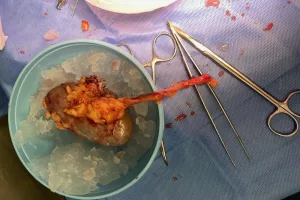
========================================
1.) How did you learn of the opportunity?
My recipient is Matt Nix. I met him in 2013 (I think) when we both taught at Floydada High School. We became Facebook friends after he moved away, and he now teaches and coaches at Memphis. I learned of the opportunity to donate when he posted it on Facebook last spring. He had some missed opportunities for a transplant, so he posted about his need on social media. Early last year, he was notified by the transplant center they had a deceased donor kidney, but when he did pre-op testing, he was positive for Covid, so they didn’t do the surgery. Then his cousin was tested to donate, but it didn’t work out. Last spring, I really felt the need to find out if I was a match and could be approved for donation. I went through testing for a little more than a year, including some testing in Lubbock and some in Dallas. I didn’t think I would be approved, but I was determined to keep going until the transplant center said no. They never did.
2.) When did the procedure happen?
The procedure happened on July 26, 2023.
3.) What is the process?
The process to donate first involves blood tests to see if you’re compatible with the recipient and to check general health. Even if you’re not approved for the person you want to donate to, you can donate to someone else, and then someone else can donate to your person. It can be a chain reaction.
If your blood test is approved for your intended recipient, you do a 24-hour urine test. You had to collect all your urine for 24 hours, and then I had to take mine to a lab in Lubbock for testing. That is primarily checking your kidney function – like if you would be okay with just one kidney. I did that in September 2022. Then after that was approved, I had to go to the kidney transplant center in Dallas for more tests: EKG, X-ray, more blood work, and to meet with the transplant team. The donor team at Dallas Methodist, where we did the transplant, is a social worker, a nephrologist, a nutritionist, a surgeon, and a coordinator. I did that right before Christmas in 2022. Then I did have to lose a little bit of weight because there are BMI requirements for the surgery. I did that in March and April of 2023 when I started walking the track after school. Then it got a bit interesting. The transplant team wanted me to redo the 24 urine test because it had been a few months since the first one. My results weren’t bad, but they didn’t make sense, so I had to redo it two more times and then go back to Dallas for an iothalamate test on my kidneys. They also had me do a stress EKG. I did most of that testing in May and June 2023. Some donors have extra tests, and some do not — it depends on which transplant hospital you are using and what kind of results you have. The transplant team is very thorough because they need to ensure that the donor will be healthy for the remainder of their life.
The process for the transplant at Dallas Methodist involves a robotic system called DaVinci. They make four incisions in the donor, and the surgeon guides the robot through removing the kidney. It gets flushed and checked by the donor’s surgeon and then checked by the recipient’s surgeon (that takes 10 minutes max), then it gets wheeled next door to the recipient’s operating room and is connected to the recipient. Each surgery takes about three hours, about six in total. The transplant team at Dallas Methodist is one of the top centers in the world.
Then after the transplant, I stayed in the hospital for about 48 hours. Then since I don’t live in Dallas, I stayed at a local hotel for about a week. Then I had post-op labs and an appointment with the surgeon and was released to come home. The recipient stayed in the hospital for about a week. He lives near Amarillo now, so he is staying at the hotel for about four weeks until he can go home. The recipient has labs and appointments about three times per week to ensure the kidney is functioning properly.
Here’s a link to a video of the procedure:
https://www.youtube.com/watch?v=weBFCu8K51A
.
4.) Where did it happen?
The procedure took place at Dallas Methodist Hospital, which is where the recipient chose to have the kidney transplant.
5.) May be obvious from above, but if not, why did you do it?
I did it because I just really felt that I was supposed to do it. I really didn’t think I would be a match or be healthy enough to donate, but it turns out that I am very healthy, and my kidney was the perfect match. I think it’s sad that in today’s world, it’s weird to be kind. It’s weird that I gave a kidney to someone I don’t know well, but I’m so glad that I did because his life is improving already. He’ll be able to grow old with his wife, see his kids grow up, and live a better life.
6.) Can you share some other thoughts, highlights, or something you’d want to know if you were reading about this story for the first time?
This process has really changed my life. I improved my health in various ways – physical, mental, and emotional. I learned to really appreciate the people in my life and the things that I have — I have a great life, and I didn’t always recognize it before.
Also, of course, not everyone can be a live organ donor. Most people can donate blood, or you can register to be a donor upon your death.

